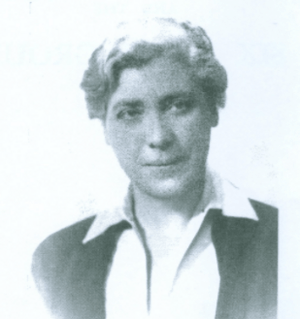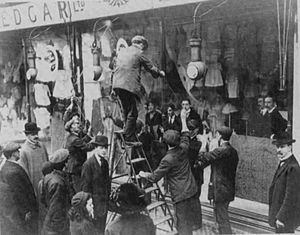Dorothy Evans facts for kids
Dorothy Elizabeth Evans (born 6 May 1888 – died 28 August 1944) was a British activist who fought for women's rights and was a suffragette. Before World War I, she was a strong organiser for the Women's Social and Political Union (WSPU). She was arrested twice in Belfast for her protest activities. In 1914, she disagreed with the WSPU's support for the war. Dorothy Evans spent the rest of her life working for peace and equal rights for women.
Contents
Who Was Dorothy Evans?
Dorothy Evans was a dedicated activist who believed in fairness for everyone. She worked hard to make sure women had the same rights as men. This included the right to vote and equal pay.
Early Life and Activism
Dorothy was born in Kentish Town, London. She went to the North London Collegiate School and then to Dartford College. There she trained to be a teacher.
In 1907, she joined the Women's Social and Political Union (WSPU). This group fought for women's right to vote. Soon after, she left her teaching job to work full-time for the WSPU in Birmingham.
During this time, Dorothy was often arrested and put in prison. This was because of her actions as a suffragette. For example, she once refused to buy a dog license as a form of protest.
In 1912, Dorothy was involved in a protest where windows were broken in the West End of London. She was sent to Aylesbury Prison. While there, she went on two hunger strikes. This meant she refused to eat to protest her treatment. She was then force-fed.
After she was released, Dorothy helped the WSPU leaders. She secretly travelled to Paris to meet Christabel Pankhurst, who was living there. Dorothy had to wear disguises to avoid being caught.
Protesting in Ireland
In 1913, Dorothy Evans was sent to Ulster, in the north of Ireland. The WSPU wanted to gain support from the Unionists there. These were people who wanted Ireland to remain part of the United Kingdom.
The WSPU had warned Irish politicians that if they didn't support votes for women, there would be a big fight. Dorothy and other activists in Belfast decided to follow the Unionists' example. The Unionists had threatened the government with serious action if they didn't get their way.
Standing Up in Ulster
In April 1913, police searched the flat Dorothy was sharing with another activist, Midge Muir. They were arrested. In court, they caused a stir by asking why a Unionist leader, James Craig, was not facing similar charges for his own protest actions.
Dorothy was found guilty and sent to Tullamore prison. She went on hunger strike again. She wrote about her experience, saying she felt "mental and spiritual peace" even though her body was suffering. Because she became very ill, Dorothy was released in July.
She was looked after by Lillian Metge, another suffragette. Lillian had also been arrested for throwing stones at the court windows during Dorothy's trial. In 1914, Dorothy declared an end to any peaceful approach in Ulster. This was after a Unionist leader, Edward Carson, did not support women's suffrage.
In the following months, WSPU activists were involved in protests against buildings owned by Unionists. They also protested against places used for men's sports and recreation. In July 1914, Lillian Metge was involved in a protest at Lisburn Cathedral.
A Champion for Peace and Equality
When World War I started in August 1914, Dorothy was in prison again. She was released as part of a general pardon for suffragettes. However, she disagreed with the WSPU's decision to support the war. She left the WSPU and joined the Independent Women's Social and Political Union.
In 1915, she tried to attend the Women's Peace Conference in the Hague, but she was not allowed to go.
Dorothy also became active with the Women's Freedom League. This group had formed earlier because they disagreed with the Pankhursts' leadership style. The Women's Freedom League believed in non-violence and opposed the war.
Fighting for Women's Rights
After the war, Dorothy continued her work for the Women's Freedom League. From 1923, she also worked for the Women's International League for Peace and Freedom.
Later, she became a key member and chairperson of the Six Point Group. This group pushed for new laws to protect children from abuse. They also fought for the rights of widowed and unmarried mothers. The group demanded equal rights for parents and equal pay and opportunities in jobs and schools. She also joined the National Union of Societies for Equal Citizenship, which had similar goals.
During World War II, Dorothy was the secretary of the Women's International League. Her main focus remained on equal opportunities in jobs. She was involved in campaigns for equal pay from 1941 to 1944. She also worked with the Women for Westminster group. This group campaigned to get more women elected as Members of Parliament (MPs). She helped write a bill in 1944 to promote equal citizenship.
Her Legacy
Dorothy Evans died in Glasgow in August 1944 after a short illness. She was 55 years old. She was in Glasgow to speak at a meeting.
Dorothy had a daughter named Lyndal. Lyndal was named after a character in a book called Story of an African Farm. At the time of Dorothy's death, Lyndal was also involved in activism. She was a member of the executive committee of the Six Point Group, continuing her mother's work for women's rights.
Images for kids




